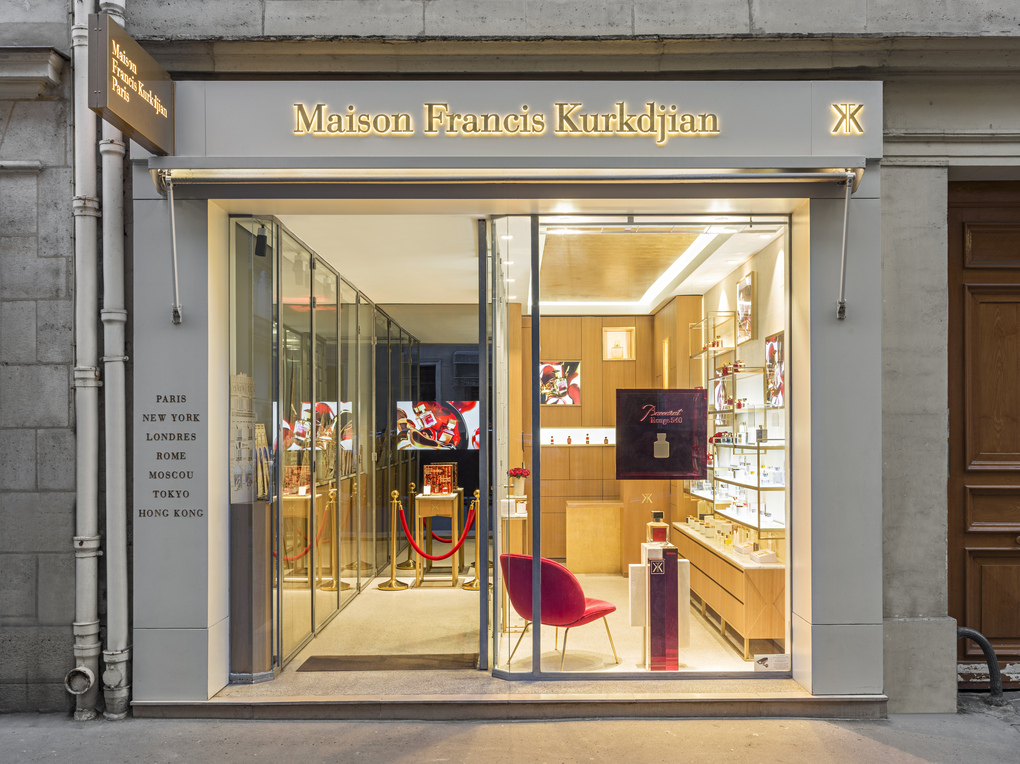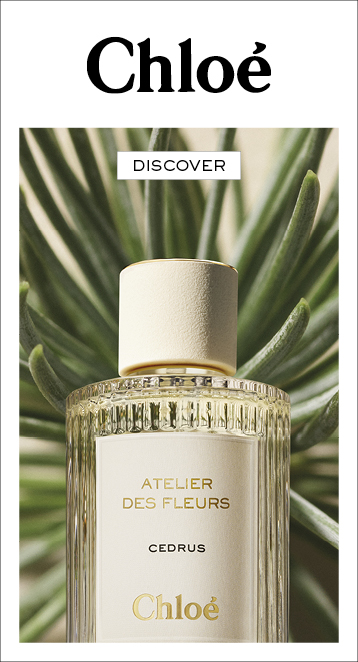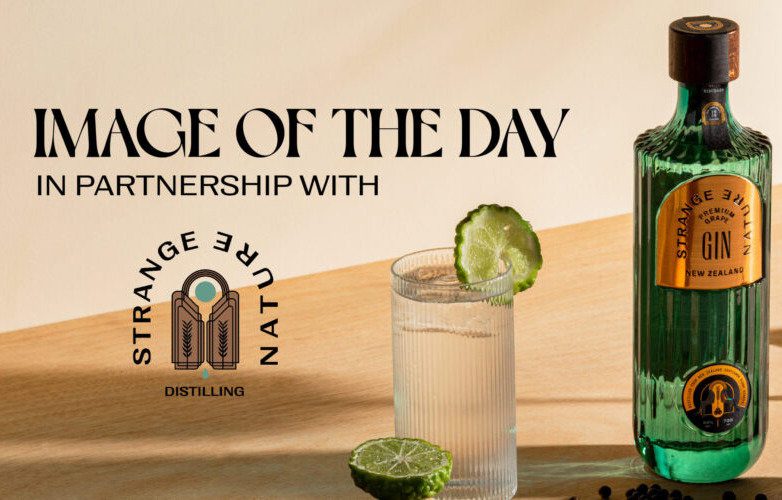
Prologue: From a chance meeting between a renowned perfumer and a global telecoms markets expert in 2009, one of the more unlikely successes of the 21st-century fragrance industry was born.
Maison Francis Kurkdjian, founded in 2009 by the perfumer in question, Francis Kurkdjian, and then-Ernst & Young Paris partner Marc Chaya, has since blossomed into one of the most-respected, positively disruptive and successful players in the luxury fragrance market.
That progress, accelerated markedly by LVMH’s majority acquisition of the house in 2017, sees Maison Francis Kurkdjian enjoy an enviable reputation for creativity, high-quality craftsmanship and a constantly experiential approach to consumer engagement.
In a compellingly candid and deeply human exchange, Maison Francis Kurkdjian Co-Founder and CEO Marc Chaya tells The Moodie Davitt Report Founder & Chairman Martin Moodie about a long-term approach to return on investment rather than seeking instant reward; on avoiding “destructive and toxic launch fever”; and on how embracing differences can bring light to the world rather than darkness.
The story of how Marc Chaya and Francis Kurkdjian met is the stuff of a scriptwriter’s dream, a chance encounter over a dinner in Paris that would lead to an extraordinary collaboration and business success narrative bearing the indelible stamp of destiny.
But Chaya offers a different context to that simplistic narrative. “People sometimes attribute things to randomness or luck. However, I feel it’s not like we were meant to work together,” he says. “But because we really get along and share the same values and we’ve worked so hard together over the past 20 years, the story became what it is.
“I feel some of the best stories are not about what was meant to be but about what you make with it. So, yes it was at a dinner party and I sat next to Francis and we engaged in a conversation about what we do in life.
“His response to me was that he was a perfumer. I was with EY (Ernst & Young) working in finance and strategy and marketing. And I got very intrigued because I come from a Lebanese family and grew up in Lebanon, where we have a very special interaction with perfume and scent.
“It’s something that entered my life even as a child. My mom had a beautiful collection of fragrances, I was fascinated by my dad’s perfume. It was a ritual to see my parents every day wear perfume. And when finally I was a teenager and I was able to own my own bottle of perfume, it was a moment I still remember today.
Recognising the role of the creator
“And so when I learned from Francis that he was the man behind Jean Paul Gaultier Le Male, which was one of my favourite scents and one of the best-selling in the world, and that he was the man behind many other extraordinary creations, I was stunned by the fact that the real artist was hidden. It came to me as a big surprise.
“And from there, through curiosity, friendship and time, we saw each other more. We travelled as friends and we talked a lot about the fragrance industry and about the world.
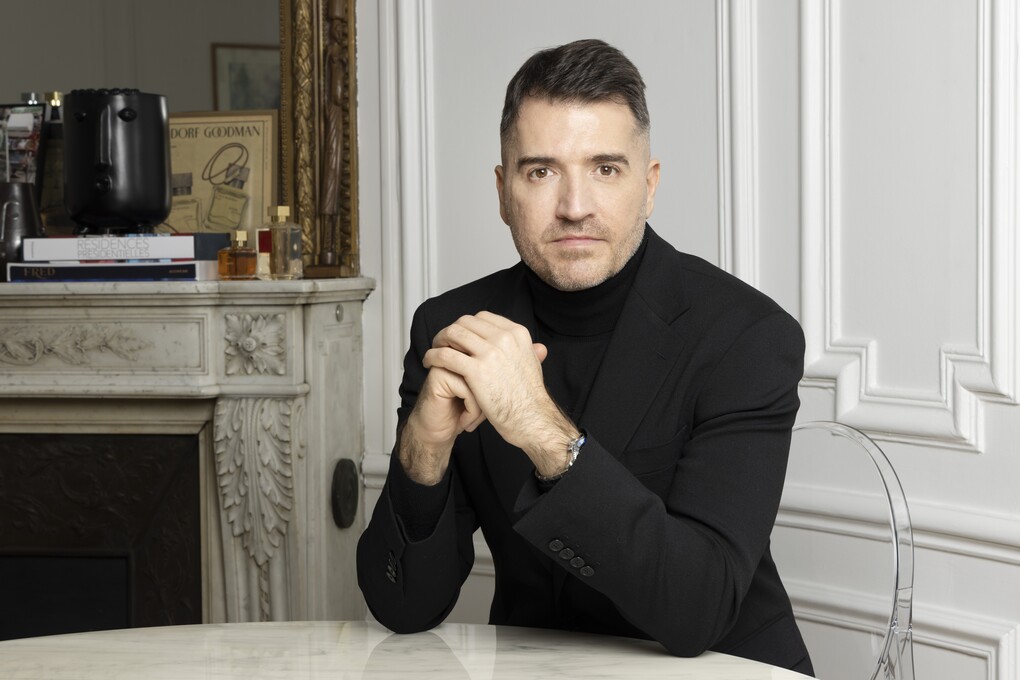
“To me, there was an opportunity to bring to life something that was unique, something very genuine and which yet was totally hidden. And that was to allow a perfumer – one of the greatest living perfumers of all time, a genius of creativity when it comes to combining scents into emotional moments – to express his vision.
“Working with Francis I discovered a form of injustice, which is that with fragrances, the celebrity, the brand name, the marketing – everything – came before the real talent who created the scent.
“It’s as if you speak about an art institution or a museum before speaking about the artist. Or you speak about the frame, or you speak about the quality of the glass, or you speak about the collector who bought the art piece before talking about the artist.
“This is unheard of. Fragrance was the only form of creativity where the genius was totally undermined and hidden behind the curtain.”

Describing the obscuring of the perfumer’s identity as an “aberration”, Chaya adds: “I hope someday we will have completed the cycle of restoring the legitimacy and the basic rights of a perfumer.
“We’ve trained generations of people in the industry who talk about fragrance in marketing terms, for example, defining what the consumer is and why the perfume sells or doesn’t sell. Every time people talk about fragrance in the industry, they talk about everything but the artistry, which is shocking.”
As their friendship developed, the two men vowed to change all that, combining their talents to embark on an adventure that would allow Kurkdjian to freely express his vision and “genius of creativity” under his own brand name.
Chaya slams the lack of intellectual property protection of that creativity. “This is outrageous. It is like people today compare a fragrance formula to a chemistry formula or to a cooking recipe. The perfumers go way beyond the essential oils and into emotion.
“It’s not about mixing rose and jasmine to make something that smells good. It is about envisioning the scent… and using essential oils, whether they’re natural or synthetic, to express an invisible emotion, something that captures you in your gut.
“The lack of IP protection has led a lot of brands to copy us, to copy beautiful scents without shame, without any legal framework that would protect our fragrance and Francis’ creativity. And when I say Francis, it’s the same for any great perfumer.”
Does he think he can change that situation? “I know that I am going to work very hard at it,” Chaya replies. “I hope it will become a success.” {Main story continues following the panel below}
Of creativity, and embracing human differences – In conversation with Marc ChayaOutside of your own business, who do you most admire in the creative world? That one is easy. I grew up in a country at war. Lebanon used to be a fantastic architectural field with a lot of contemporary architecture and modernism. Everything got destroyed. In my childhood, I was very often facing chaos, destruction, fear, anxiety and sorrow. So I found a refuge out of this chaos in art and literature. I developed this almost survival mode where harmony and beauty would uplift my life and make me feel better. And so today, I’m very attracted to many fields of art, but most of them are in the fields of architecture. Because when you live in a beautiful home that is well designed, where the light enters, where the volumes speak to you, it makes your life better. I also admire the creative arts and Fine Arts with artists like Francis Bacon or more contemporary ones like Anthony Gormley. I need art in my life; I need music, I need harmony. This is what makes me more connected to myself and helps me recharge and rebalance. So it’s all about, you know, fine art, decorative art design, architecture, in addition, of course, to fragrance, which is my passion. “These values have paved the way to the success we find ourselves in today. Every day when we wake up early in the morning, we think about what’s next and how we can become even better at what we do. I read about your love of different music and in particular that of Lebanese oud player and composer Rabih-Abou Khalil. It’s intensely atmospheric and urgent music, isn’t it? What I love about Rabih-Abou Khalil is his music shows you how powerful it is when you combine different cultures. He is a jazzman but he combines classical jazz instruments such as the saxophone and the bass with the oud, the Arabic guitar with the derbeke, the Arabic drum. And he creates a whole new world out of the Arabic classical music, which we call tarab, and jazz. It’s extraordinary, You can do simplistic commercial fusion music but Khailil’s work can also do extremely, elaborate creative and beautiful fusion music in different fields. And what I love in life is to see the wealth that you can create when you open up cultures to one another, rather than opposing them.  For me, it always goes back to me living in a country where people valued their community above other peoples’ communities, their religion against other religions, their belief, their cuisine, the way they dress – everything has to be black and white. I am like this, you’re like that, and let’s fight, let’s kill each other and unfortunately that is the sad story of the world we live in. “For me, looking at the wealth that comes from combining differences rather than opposing them and the value, wellbeing and progress that comes from that makes me want to fight for it every day. And it makes me think that anyone who believes in hatred, who believes in other people being inferior because they’re different is a primitive being. I feel that art is a way to connect us with progress and evolution. Martin Luther King said: “Darkness cannot drive out darkness; only light can do that. Hate cannot drive out hate; only love can do that.” And the light is education, the light is courage, the light is kindness, the light is all of these things. The light is something that can show the way and, thankfully, the arts in general, have been a very big component of that light. |
Standing out from the crowd
Maison Francis Kurkdjian’s obsession with creativity colours Chaya’s view of the surging global proliferation of niche fragrances in recent years. Rather than fretting about competition and responding hastily to it, he insists it is about sticking to principles.
“When you’re in a crowd of people shouting, and you’re trying to shout louder, no-one’s going to hear you. Eventually, all that people will hear is noise. What we’ve learned throughout our experience is never to lose sight of who we are, and never to lose sight of what is important.
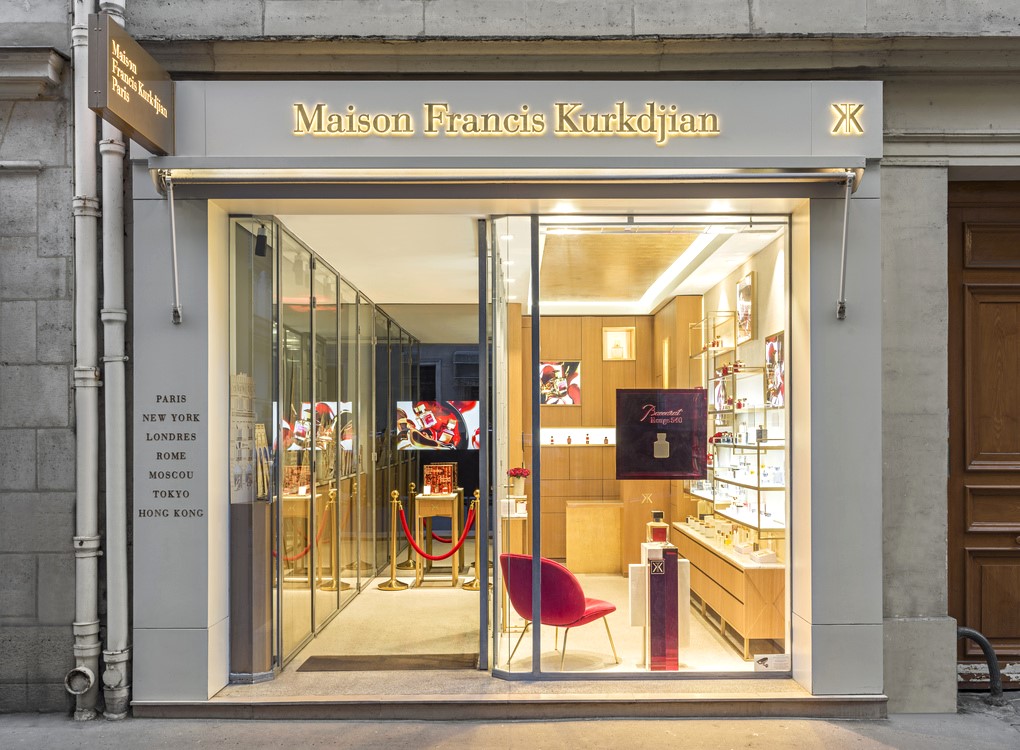
“Our point of difference is underlined by our commitment to the extraordinary – the extraordinary genius of creativity, of extraordinary craft, and of an extraordinary customer journey at the point-of-sale, and the deep belief that what is made with time is respected by time,” says Chaya.
“Our strategy has always been to religiously apply strategies where we feel comfortable expressing who we are in the right way.”
Chaya says Maison Francis Kurkdjian resists pressure for instant reward or quickfire success. “Do not fear very successful brands that come overnight and sell a lot because eventually we are going to conquer their market share with meaning,” he adds. “So we need time and we need intimacy with our customers.
“It took us about ten years to become market leaders in the US. We were exclusive to Neiman Marcus for seven years; we worked passionately with our customers and with Neiman Marcus. And we did the same in the UK and everywhere else – it’s about time and passion.”
Scents and sensibility in China
The same applies to China, a market that has undergone profound, almost unforeseeable growth in fragrances over recent years.
“History repeats itself. The situation we’re seeing in China with fragrances is something we’ve seen in other fields before,” Chaya observes.

“Take technology, for example. It took the Western world about 20 years to climb the ladder of innovation in broadband and mobile technology. As a child who grew up in France, I remember my first internet connection was through a modem that was analogue. Today’s world would not function with the bandwidth we had at the time. My first mobile phone was an old phone without a screen, where we sent texts by typing on the numbers.
“But when China woke up to technology and to broadband, they rolled out the crème de la crème immediately to its consumers. So when Chinese consumers embraced digital and embraced the internet, they embraced it immediately with broadband and wireless. And so they were able to invent an ecosystem that was extremely new, extremely effective and efficient, and totally different from the rest of the world.
“That was not because Chinese people are fundamentally and inherently different. They are people like us with emotions, fears, loves, ideas and ambitions.
“It’s just that they had the opportunity to start from a blank page with the best of the best. And because there are many people living in China, it becomes very, very visible and the marketplace is so huge that the inbound market is an entity in itself. It doesn’t need the rest of the world.”
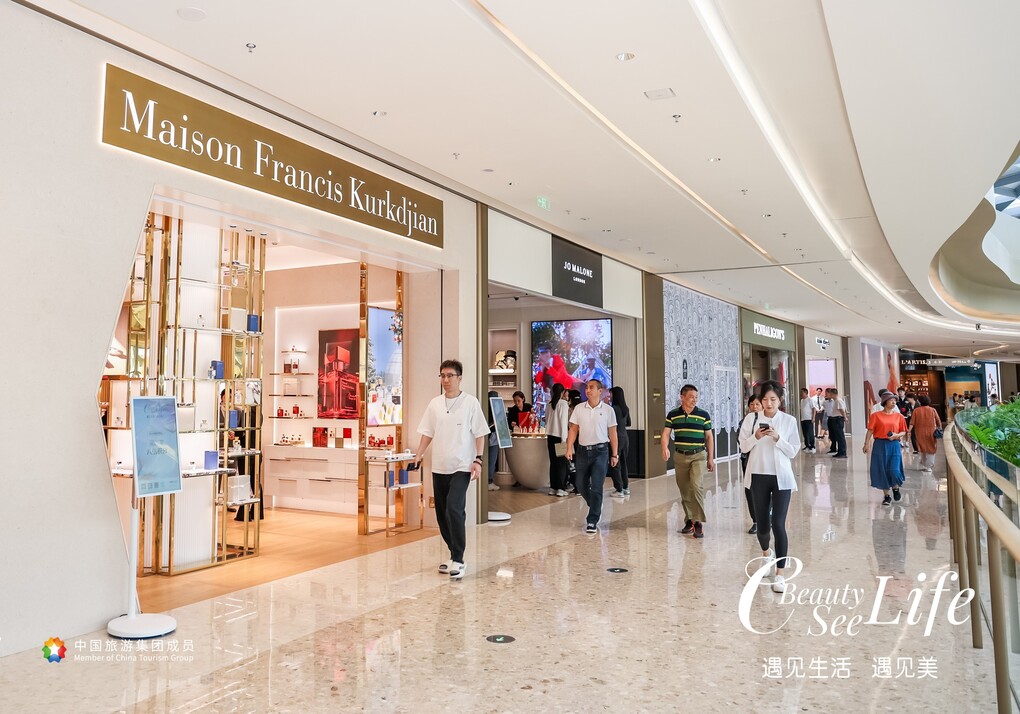
The parallel with fragrances is clear, he says. “About 20 years ago, there was a rise in the niche fragrance segment in Europe and the US. Nothing new. It was driven by people wanting to move away from designer and celebrity brands that were mass marketed and mass distributed under the ‘masstige’ category – a combination of mass market and prestige brands – literally designer and celebrity brands that were available in over 50,000 doors.
“People wanted to move away from that and embrace a new category that was more limited in its distribution, more creative in its packaging, sharper in its storytelling, edgier in its composition. Fragrances that were not meant to please the maximum number of people, and could also be disruptive.
“Maison Francis Kurkdjian is a native of this movement,” he continues of the huge boom across Europe of niche fragrances two decades ago. “However, we are not a niche brand. We had to fight against this movement where standard marketing approaches were being used to celebrate more creative, narrower-audience scents, but still with the same ingredients. That became more important than eventually what goes into the bottle and who creates what goes into the bottle.
“Of all these brands that flowered and boomed in the 2000s and 2010s, only a few like us became leaders because they were able to demonstrate a very specific, creative and renewable know-how. Of course, we all have to know marketing execution, finance and sales and drive extraordinary teams to succeed. But desirability is only the consequence of a very specific know-how – and that is a creative know-how.”
Fostering “the genius of creativity”
As with technology, China immediately embraced the niche category without having to go through the ‘masstige’ phase, Chaya observes. “People in China didn’t wear perfume for a very long time, it was all about skincare. So China missed the entire 80 years that we had to go through in Europe, embracing first ‘masstige’, then niche, and then becoming more selective in niche to see only a few brands succeed in what became the ultra-high-end luxury fragrance world where we are a recognised global leader.”
In contrast to Europe, the China mass market immediately embraced the niche category – “which is booming in China” – and bringing many new concepts to market, Chaya observes. However, most are marketing concepts, serving a purpose in a booming market as newcomers to the fragrance world want to learn more about it, he adds.
“I believe that eventually this will also go through the same maturity curve that we’ve seen in Europe. The more consumers learn about the industry, scents – how to smell them, wear them, interact and live with them, the more they will mature.
“They will move away from the simplistic, ‘instant reward’ marketing message to the more complex, more rewarding, more sophisticated, creative message. That is where we sit and where we foster. It’s going to take time, but it’s a matter of when not how in my humble point of view.”
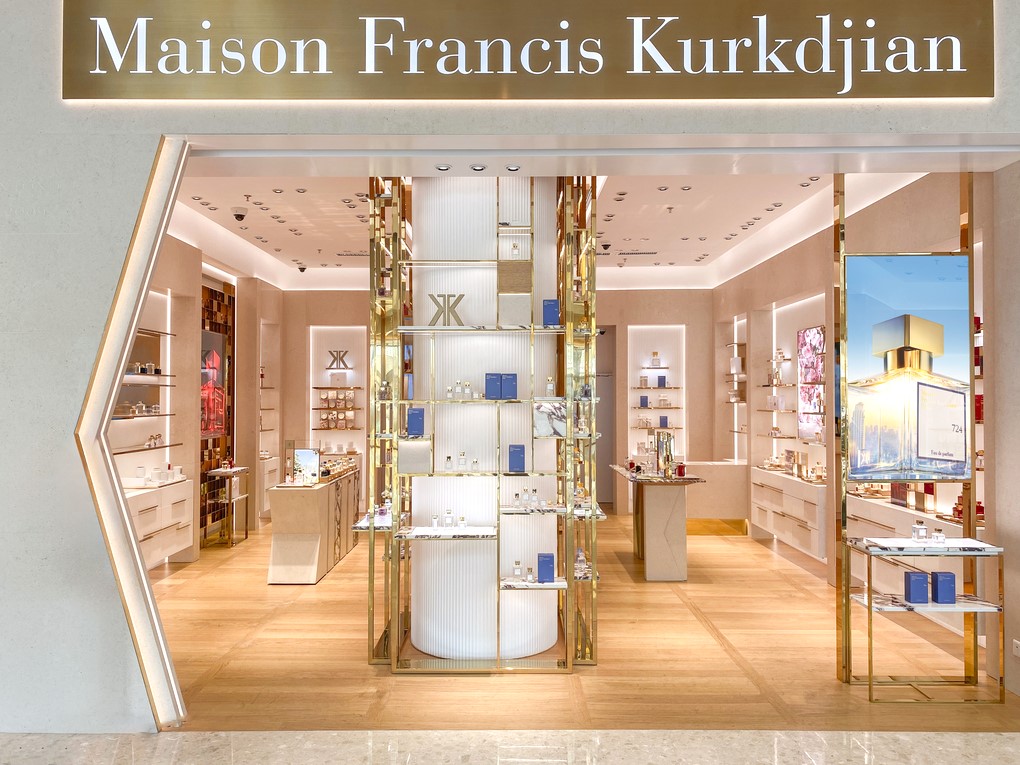
And time is precisely what Maison Francis Kurkdjian intends to take. The brand’s strategy is to ensure everything it does in China is within what Chaya dubs “the genius of creativity”.
“We do not come to China with simplistic ideas just because we want to be competitive in a heavily marketing-led environment,” he explains. “We’re not going to use celebrities to endorse the brand just because we want people to know about the brand. We never use celebrities but we are very proud to see many celebrities naturally talk about the brand [globally] and this happens in China too.

“We want to bring our deepest knowledge, which is a creative vision of our craft, which is to open beautiful stores where people have time to step away from chaos and enter into meaningful stores and discover extraordinary scents. We have started conversations with artists in China, where Francis and they will come up eventually with something that is beautiful and extraordinary.
“All of this takes time and isn’t immediately visible, but it builds up step by step. It’s like a love story – you meet someone, fall in love, and eventually one day you get married. It doesn’t happen overnight.”
Avoiding launch fever
Pivotal to that belief is how Maison Francis Kurkdjian approaches product launches. Chaya is on record describing “launch fever” as a “weapon of mass destruction”.
“The day you turn your back on your philosophy is the day you turn your back on your brand purpose,” he explains. “The way we handle product launches is integral to our approach and philosophy. We believe that rushing into launches and succumbing to launch fever can be destructive and toxic, resulting in a chaotic product lifecycle where new products replace old ones without due consideration or time for them to truly exist and be appreciated by customers.”
Chaya relates a telling anecdote of Maison Francis Kurkdjian’s growth in the key US local market as niche fragrances boomed.
“When we entered the US and the market was booming, every time we introduced something new, the question from people who worked in the stores, our product specialists, the entire sales infrastructure, the buyers would be ‘What’s next?’.
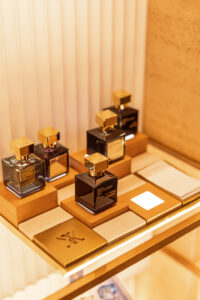
“It’s scary. And at some stage, we were pushed into this destructive, toxic momentum, where we would see brands throw in collections after collections. The new simply replaces what was new the day before, which becomes old and the lifecycle of the product becomes chaotic.”
Recognising the downward spiral this represented, Maison Francis Kurkdjian decided to step back. The rationale was multi-fold, Chaya explains. “Firstly, if we are not ready, we cannot launch. By launching a lot we are denying our creative identity; and in creation it doesn’t happen overnight. You need time to let a beautiful idea come to life.
“So, step one, I decided to move away from launches to re-educate my team – that it was not with the novelties they needed to do their business, but by celebrating the wealth of what we already had. It took us time, but eventually we prevailed, and it was a very, very smart thing to do.
“Secondly, we moved away from the pressure of marketing calendars. You announce something to the market, then you have to deliver. But what if I’m not ready? Francis is the creator – what if he’s not ready? What if the scent is not perfect as he wanted?
“So, we’ve learnt to move away from that to refocus on our key franchises, beautiful stories such as A La Rose, Gentle Fluidity, Oud Satin Mood, Grand Soir. These are all treasures and extraordinary creations that didn’t have enough time to exist because the market was constantly pushing for more, more, more.
“Today, we spend the bulk of our time celebrating what we already have. And from time to time, every two years or so, a new fragrance will come to us when Francis is inspired and we feel it will add desirability and value to our brand.
“A lot of brands want to open an entire network overnight. We don’t believe in that: we believe in opening door by door, focusing on the experience, and climbing our way up to the top in every door. This offers a lot of value. Because you learn more and you build greater interaction with your customer and give them a more beautiful experience. You don’t stretch yourself over a huge, huge distribution network overnight. It took us 16 years to open 800 doors globally, some brands open 300 doors overnight!
“We believe that when you are a creative brand which focuses a lot on craftsmanship, quality, genuine equity and excellence that focuses a lot on a value, that is return on investment rather than instant reward.
“In essence, our approach is all about taking the necessary time to create beautiful things, you need time to market beautiful things, and you need time to let them foster and grow. We believe that this is the foundation of a sustainable, successful brand.”
How LVMH helped scale while reaffirming the creative principles
Chaya’s and Kurkdjian’s long-held resistance to being driven by the market and instead leaning vehemently to your principles is admirable. I ask whether that changed after the LVMH acquisition in 2017? After all, LVMH is a mega-sized corporate and one with quarterly results to report. Did that put greater pressure on Maison Francis Kurkdjian to launch more often? To be less measured?
“Absolutely not,” Chaya replies instantly. “And I will tell you why. One, when we joined LVMH, it was something that we and Francis wanted – we didn’t have to as we were already extremely successful. We were cash generating and very profitable. So, it wasn’t a financial goal. It was a transmission and we were looking for a place where the brand could foster and grow, attract talent, learn and become smarter.
“LVMH is indeed a big corporation, but it’s not a single entity like many of its competitors. Rather, it’s an agglomeration of many heritage maisons.
“This is true about Hennessy that has been here for 300 years; it is true about beautiful houses like Loro Piana and Louis Vuitton, Dior and Celine – every brand is unique and every brand is independent. We are not run as business units, but as maisons.
“The group has gathered some of the greatest creative minds in history. The greatest designers have, are and will be working within the LVMH maison. It’s an extraordinary space for creativity.
“LVMH also celebrates the freedom of entrepreneurship. So we are entrepreneurs, we are creative, and our success comes because we are in the right ecosystem. The group has helped us a lot to grow, learn, accelerate the learning curve, and attract key talents that bring the best of themselves.”

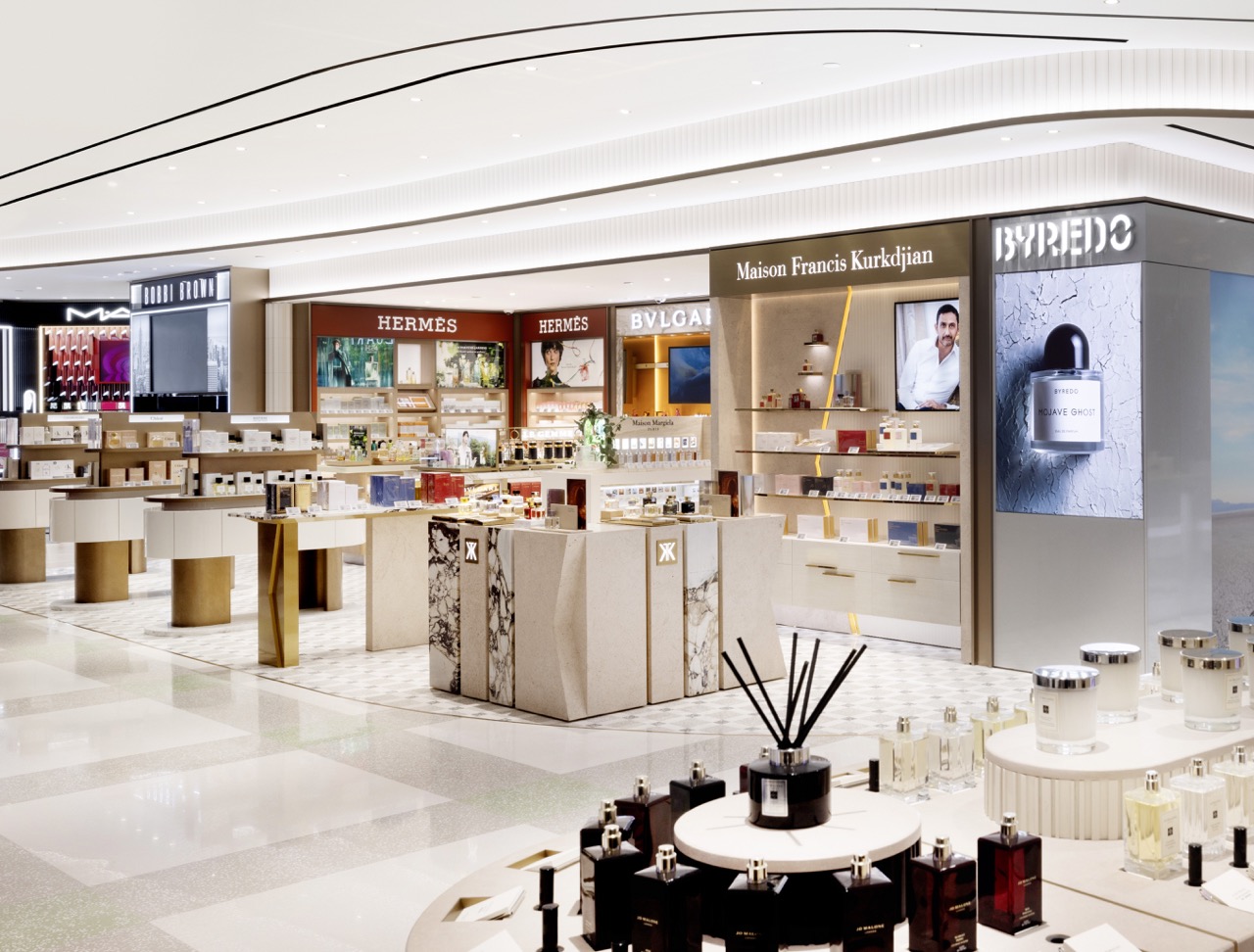
Chaya describes the alliance with LVMH as “an extraordinary journey” during which the house has succeeded in coping with dramatic growth. “We multiplied ourselves by five in the past five years. It is a huge endeavour to deal with growth and change management. To grow from 20 people to 300 globally; open subsidiaries; become more focused on quality; embrace change topics like sustainability.
“All this while Francis and I are still at the helm of the company. And we are celebrated for what we do. It has been an extraordinary journey.
“We have managed to scale without in any way eroding our principles,” Chaya continues, citing the brand’s largest market, the US, which accounts for about half of global sales.
“Multiplying our sales by five was not through opening new doors; it was about multiplying our sales by five in every door where we are. There’s a big difference there – you don’t stretch yourself out, you stretch yourself up.
“For instance, we have doors at Neiman [Marcus] that used to generate US$300,000 a year and now reach US$3-$4 million. Our productivity per door is unprecedented and is the consequence of desirability. It is the consequence of everything that I have mentioned before – the fact that our customers recognise our maison as being something very authentic, genuine and creative.
“This makes them want to love the maison further and experience our collections further. Our growth has been a direct consequence of what is done religiously – focus on creativity, quality, ingenuity and same-store/strong growth.”
Talking travel retail
Maison Francis Kurkdjian has upped its presence considerably in recent years though its same strict criteria of which doors to enter has remained, Chaya says.
“As a maison, we want to reach out to our customers in places where we can offer them extraordinary experiences. We’re not going to be in all airports because our approach is not to be mass marketed. The same way we went in domestic markets. We go to the most beautiful department stores and open boutiques in the most stunning malls in limited numbers.
“We focus on the experience in those malls, counters and boutiques and we are doing exactly the same when it comes to airports.
“We have seen airports change a lot over the past decade. They moved from utility spaces to experience spaces,” he continues. “When I was a child and I would go to an airport, it was completely transactional. The airport lounge didn’t exist. Travel retail was a small kiosk where you could buy a small bottle of perfume or a sandwich. Then it was about queuing in line to get into your flight that segment
“Today, we’ve seen airports grow into cities… where we connect more and spend more time and this time can be qualitative and experiential.

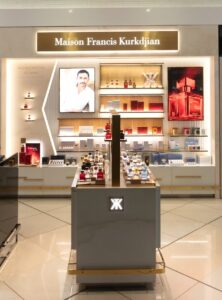
“We’ve seen airports transform into places where you have access to wellbeing and selfcare through spas. You have lounges that take into account jetlag and offer the freedom to enjoy a great lunch, even gourmet cuisine. You can entertain, you can watch movies, you can play games, you can spend quality time with your family, and travel becomes only part of the journey. It’s no longer just a transactional suffering… it has become something that people enjoy.
“What we now see is that airports are places where you can have a very memorable and very sophisticated shopping experience. We’ve seen great success, for example, with our outlet in Charles de Gaulle, and we’re planning to expand into larger, nicer locations. It’s about moving away from small, transactional spaces to larger areas where customers can experience our collection, personalise their product, and learn more about our stories.
“In Asia, we’ve opened a big boutique in Hainan; we’ve expanded in Heathrow, and are opening a beautiful counter in São Paulo. We currently have about 30 offline locations, including a very nice counter in Dubai, that in terms of performance is very successful. Istanbul is a multi-million dollar airport for us; the same for Abu Dhabi, Bahrain, Charles de Gaulle. So we are expanding in travel retail, but we’re doing it the same way we’ve expanded in the domestic market – qualitatively, passionately and with time.”
Quality in Qatar
Chaya is particularly excited about the brand’s performance with Qatar Duty Free at Hamad International Airport with two locations that were established during the airport’s renovation.
Because of the brand’s “extraordinary” performance, Maison Francis Kurkdjian is in talks with Qatar Duty Free to secure larger locations. But it’s not a case of size is everything, Chaya insists.
“We’re moving away from these beautiful small locations where you establish the fact that the brand is desirable. In order to sustain the productivity and the desirability, you need to move away from the transactional and into the experiential. For us this is very important,
“This is not a narcissistic move where we ask our partners for bigger locations just because we want to be big,” he comments. “We actually are asking our partners for the right location in order for us to move from transactional to experiential, where people can sit and explore the fragrances of Maison Francis Kurkdjian, learn more about the underlying stories that come with our brand, and have the pleasure of engraving and personalising their bottles.
“It’s all about creating a beautiful experience for our customers, not just in travel retail, but also in the domestic market.”
Discovering the goldmine of failure
From travel retail, this fascinating conversation moves to the journey every entrepreneur goes through, the gamut of emotions, the highs, the lows. What has been his favourite moment during that journey and his biggest challenge?
Chaya isn’t one for simplistic answers. “I always have a hard time pinpointing specific moments in the entrepreneurial journey because it is filled with diverse experiences,” he responds. “What I do know is that this journey consists of various elements – successes to be celebrated and protected, and failures that are a goldmine, because you learn from them.
“There are several quotes that continually inspire me. One (from Senegal) which says, ‘If you don’t know where you’re going, remember where you’re coming from’ (‘Lorsque tu ne sais pas où tu vas, regardes d’où tu viens’). This has always been a source of inspiration for me. Another is from Winston Churchill, who said, ‘If you’re going through hell, keep going.’
“So when you face difficult moments, learn from them, keep going, and keep fighting. The ability to overcome these challenges is what eventually leads to success. Mistakes truly are a goldmine – this is always something I remind my team about. And when you win, and when you are super successful, don’t lose sight of what’s coming tomorrow.
“People often tell Francis and I that we don’t take enough time to celebrate our victories, and it’s true. It’s a shame, we should take more time to celebrate, but we are always focused on what’s next.
“When you strive for excellence, a lot of people lose the value of return on investment and excellence. Of course, you need kindness in an environment that fosters excellence, otherwise it becomes very, very scary. But when you strive for excellence, you could just say, ‘Oh, I’m now at the top of my game. I’m going to stop exercising. I’m a celebrity ballet dancer, I’m a star dancer. I’ll be in the Paris ballet and I’m going to stop dancing.’
“But no, I’m going to dance even ten times more, because now people look at me even more. And there are other people looking up to me.”
Chaya is in free flow now, this rare and refreshing combination of adroit businessman and disciple of the creative process, telling it as he sees it. “We’re in a business where ideas are only 10% of the equation. It’s our ability to bring them to life with excellence, passion and hard work that makes the difference.
“So my life journey as an entrepreneur has been nothing less than a blessing. It’s been a lot of suffering – as you said blood, tears and sweat – but sweat can be good because it means you went to the gym, and tears can be tears of joy. So it’s a mix of all that. It’s not just hardship, it’s also a lot of joy.
“Maison Francis Kurkdjian is a human adventure where fragrance is the hero. And it is this beautiful environment where we come together with our teams – a diverse community, with artists, with our retail partners – around strong values, that have really paved the way to the success that we see ourselves enjoying today. But every day, when we wake up early in the morning, we think about what’s next. And how are we going to become even better in what we do.” ✈





